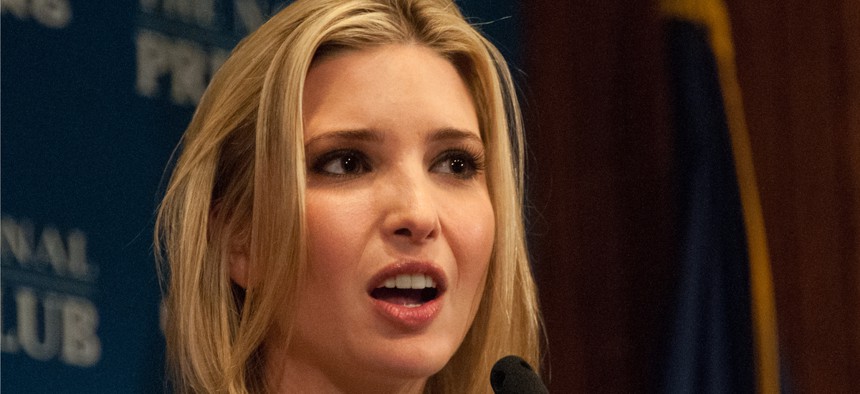Ivanka Trump Won Lucrative Chinese Trademarks the Same Day She Dined with China's President
The timing raises yet another round of ethics questions.
At U.S. president Donald Trump’s Mar-a-Lago resort on April 6, Ivanka Trump—the president’s daughter, and now officially an advisor—joined in on a dinner of steak and Dover sole with Chinese president Xi Jinping. It was part of a widely publicized summit where trade cooperation between China and the U.S. was a main topic of discussion.
On the same day, according to a new report by the AP, China’s government granted Ivanka Trump’s brand provisional approval for three new trademarks that, as the AP put it, give it “monopoly rights to sell Ivanka brand jewelry, bags and spa services in the world’s second-largest economy.”
Trump resigned from all management and operational roles with her brand earlier this year. But she still owns the label, and the timing of the Chinese government’s decision raises yet another round of ethical questions about whether the Trump family is profiting financially from its new political power.
Since Donald Trump won the U.S. presidency, foreign offices have been quick to grant the Trump family’s trademark applications, and the Chinese market could be a particularly lucrative one for Ivanka. She’s a well-known, well-liked figure in the country—so much so that Chinese companies have been rushing to claim the rights to use her name to sell everything from booze to wallpaper.
That’s because China’s laws offer local businesses a good deal of leeway on using the names of foreign celebrities. Basketball star Michael Jordan, for instance, battled for years to win back the rights to the Chinese version of his name that was already being used by a Chinese company.
Ivanka, meanwhile, appears set to profit substantially as the brand bearing her name grows in the country, whether she’s actively involved in it or not.
In a statement, Abigail Klem, president of the Ivanka Trump brand, suggested there was nothing unusual about the China trademarks. “The brand has filed, updated, and rigorously protected its international trademarks over the past several years in the normal course of business, especially in regions where trademark infringement is rampant,” she said. “We have recently seen a surge in trademark filings by unrelated third parties trying to capitalize on the name and it is our responsibility to diligently protect our trademark.”
It isn’t illegal to have one’s personal brand benefit from the name recognition that comes from a high-profile government position. And it’s also entirely possible the timing of the Chinese government’s decision on the trademarks had nothing to do with Trump’s meeting with Xi Jinping.
But U.S. conflict-of-interest laws do prohibit federal officials—a category that now officially includes Ivanka Trump—from taking part in government matters that affect their own financial interests or their spouse’s. (Trump’s husband, Jared Kushner, is of course also part of the Trump White House.) As the Trump family’s business interests continue to expand, ethics experts worry that they won’t be able to keep business and political appropriately separated.
“Put the business on hold and stop trying to get trademarks while you’re in government,” Richard Painter, the chief White House ethics lawyer under George W. Bush, remarked to the AP.
In China, the boundaries between business and politics are becoming blurrier for Ivanka Trump.



